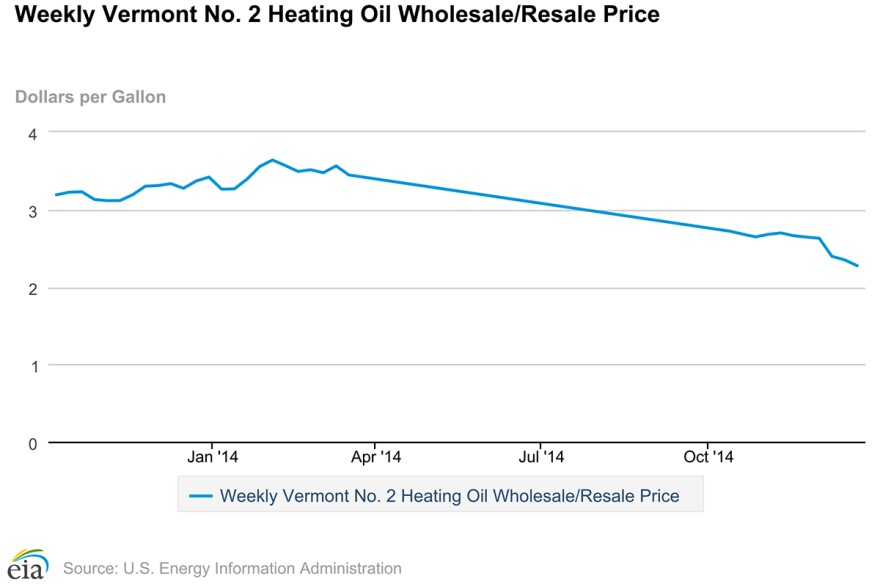If you heat your home with oil, chances are you are starting the new year in a pretty good mood. Prices are down by about 25 percent since last February. But if you locked in a price last summer, there’s a little less reason to celebrate.
Heating oil has taken a dive from an average high of about $3.94 a gallon last February to about $2.90 this week. But you won’t get that windfall if you committed to a price last summer — and neither will your oil dealer. State law requires the dealer to buy your oil from a wholesaler as soon as you sign a pre-season contract. Matt Cota, executive director of the Vermont Fuel Dealers Association, says that means the dealer can’t take unfair advantage of price drops after the contract is signed.
“And it really reinforces the fact that when you lock in a price, you know the dealer and the consumer are in it together,” Cota says.
Cota links current — and possibly future — price declines to an upswing in domestic production.

Another consumer boon: As of July 1, state law requires dealers to sell only low-sulfur oil.
“What that does is it reduces the scale build up on your heat exchanger, it makes your equipment operate more efficiently, and so we are going to see further declines in consumption based on new equipment, better fuel and better home construction,” says Cota.
We are going to see further declines in consumption based on new equipment, better fuel and better home construction." - Matt Cota, executive director of the Vermont Fuel Dealers Association
The bad news every year is a lot of Vermont’s homes are old, not well insulated and are heated with aging furnaces. The good news this year, Cota says, is that most homeowners did not lock in prices. Many stopped doing that after 2008, when prices hit a peak in the summer and dropped during the heating season.
Lower fuel costs may also increase the number of Vermonters who get heating assistance. Normally that subsidy reaches about 40 percent of the low-income families who apply, but this year the federal grant is likely to go further.
Many schools, though, are not so lucky. Norm Etkind is the energy director for the Vermont Superintendents Association. He says many schools are stuck with fuel contracts they signed this past summer.
“Going forward, of course some schools will get some savings by buying oil at a lower price, but I don’t think many schools are figuring that these lower prices will last. I don’t think that it is going to greatly impact their budgeting,” Etkind says.
"Going forward, of course some schools will get some savings by buying oil at a lower price, but I don't think many schools are figuring that these lower prices will last. I don't think that it is going to greatly impact their budgeting." - Norm Etkind, energy director for the Vermont Superintendents Association
The difficulty of budgeting for volatile oil prices is one reason, he adds, that almost one third of Vermont’s students now attend schools heated with wood chips. Many others are converting to pellet furnaces.
Housing agencies are also trying to reduce their reliance on oil. Andrew Winter, executive director of Twin Pines Housing Trust in the Upper Valley, says there's no way to know where prices will go in the future. So to make affordable housing really cost-effective, it’s important to reduce energy consumption by weatherizing existing units.
“And when we are building new homes, as well as new apartments, we are looking at really pushing the envelope, literally, on energy efficiency,” Winter says.
But unfortunately, he notes, tenants in the Trust’s existing properties will not benefit from relatively cheap oil this winter, since heat is included in their rent and Twin Pines Housing Trust, like many similar agencies, made their fuel deals long before temperatures — and prices — plummeted.





